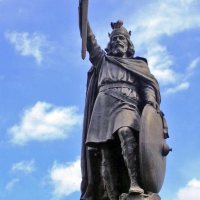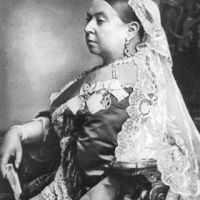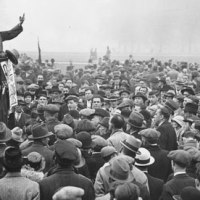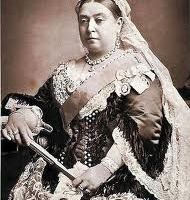Queen Victoria……
Queen Victoria had difficulty with the rules of constitutional monarchy. She firmly believed that she was the bastion of empire. 
Whilst she was not a visible monarch, she caused utmost trouble for her ministers, many of whom trembled in her presence. Of course she didn't have the power to remove their heads, but she did have the power to influence their appointments, and woe betide those who were out of favour.
During her long reign her subjects blew hot and cold. Yet she survived attacks on her position, even during periods of extreme anti-royalist sentiments.
She was an enigma. History has not been kind to her, yet she was a woman, and that played strong on her power and legacy.
In the second Elizabethan age, the current Queen is a direct descendant of Victoria.
Elizabeth II is the eldest child of George VI, who was the son of George V, who was the son of Edward VII, who was the eldest son of Victoria. 
Victoria believed that to ensure peace in Europe she would micro-manage the marriages of her children. A commendable but flawed belief. By the time her grandson George V came to the throne, he was related to every crowned head in Europe.
Had she lived longer she would have been horrified to see her vision plunged into darkness, a darkness which cast the world into the greatest conflict in history. It’s called the Great War and spawned WWII. The two major wars in history began as seeds in Victorian Britain.
Her husband's death in 1861 sent her into a bereavement which she never recovered from. But before we castigate her for her isolation, we should consider that she had lost her rock, her true love, her support.
In that regard she was human beyond measure. Forget about her privilege, forget about her luxury, and forget about her position. Fundamentally, she had lost the thing she loved, and love, above all else, is an emotion which transcends everything else. It could be argued that she had the love of her many children, but in context of the times her position was a barrier, and protocol has changed little.
Victoria had a manipulative mother, was surrounded by people who moved on a chess board vying for position. She was born as a result of necessity, because although George III  had over 50 grandchildren – none were legitimate.
had over 50 grandchildren – none were legitimate.
The state of the Hanoverian Dynasty in 18th Century England was a mess, and something had to be done. The story of the planning to ensure an heir in this complicated puzzle is for another time, but Victoria from an early age, knew she would become queen.
Every move, every contact, was meticulously managed, so by the time she was crowned at 19 she was primed and ready. But she reacted totally contrary to her mentors. She rebelled. She shunned all of those who controlled her. Once crowned she was free. Her youth made her distant and ignorant of her people, but she grew and matured to become the greatest Queen of all time.
This was down to her husband Albert, – a man who also was a victim of a system which designed marriage as convenience, and was born to embrace a unity of political expediency.
Sober, serious and traditional, Albert was a family man and Vicky fell in love. 
A man astutely skilled in diplomacy, who was frustrated at his lack of influence in his adopted country, but who influenced his wife significantly.
It was this influence which created the Victorian Age.
Today we talk about Victorian values and principles. For many it is a period of work ethics, responsibility, and family duty. We do not relate these qualities to any other era. It is a direct result of Victoria, her maternal behaviour, her morality, and indeed, her intransigence and strength.
She oversaw a period of incredible growth and power. Yet she didn't just sit on the throne, she influenced her ministers, her governments and their behaviour. More than anyone else, she epitomised the British Empire.
Critics would argue that point, but her battles with her prime ministers are well documented. She regarded Gladstone as a dangerous idiot who was weak and too ready to compromise.  She was enthralled by Disraeli, who she freely admitted charmed her.
She was enthralled by Disraeli, who she freely admitted charmed her.
Whilst she was rarely seen in public, she knew every cabinet decision, communicated directly with her ministers and generals, and kept abreast with every political issue of her day. If she didn't agree with something she would make sure her point of view was recorded.
She wrote prolifically, and never missed a day for her diary. She took a major interest in the events of her time, the Crimean War, the Afghan wars, the Indian Mutiny, the Zulu Wars, and scores of other international events.
She blamed Gladstone publicly for his failure to support Gordon in the Sudan, and had he listened to her, troops would have arrived earlier to prevent his death. A death which hurt her deeply, especially when she learnt his head was cut off and displayed as a trophy.
She told Gladstone to never lose ground, to never concede to land gained, to never withdraw, because it would destroy the empire and show weakness.
She never encouraged imperial acquisition, yet knew the value and economics of it – but was of the firm belief that once gained, it should never be lost. This she believed was the key to empire. To lose it would be weak.
She had a rare sense of humour, yet also appreciated it in return. On one occasion, over dinner, she berated Disraeli because of his foreign policy "What are you waiting for?” she said
“At present Maam, it’s peas and potatoes“ he replied. 
Her compassion exuded during the India troubles. She was shocked by the events, but instigated the end of the British East India Company, to such an extent that she quelled a revolution which could have finished off British interests there once and for all.
She was horrified at the events of the massacre of Isandlwana when the Zulus destroyed her army, but remarked ,without vengeance or bitterness, that it would be most undignified to destroy a proud warrior race, and the Zulu Chief Cetewayo must be treated with absolute respect. Cetewayo – a warrior and king – was astounded.
She didn't like the Turks, but she didn't like the Russians either, and considered that the latter was the greater problem. She said that the Russian's must be taught a lesson once and for all, and this was after the Crimean War. Indeed, she remarked that they will be very difficult in the future.
Throughout her reign she was generally unknown to her public. She refused most of the time to attend the state opening of Parliament because she would have to walk alone down the hallowed aisle and didn't want to be treated like some specimen on display. "I am a weak old woman" she would say "How can you subject me to this tiring display of pomp."
She utilised the vulnerable woman persona, and forced her ministers to travel to Balmoral in Scotland, or Osborne House on the Isle of Wight to have an audience with her. They really resented it, but they couldn't resist. She was the Queen, and she exercised power.
She was a prude. She ruled her children with an iron will, she dictated to them her expectations, and she treated her many governments with the same authority. Yet, she didn't have any real authority, she was a constitutional monarch, but she made sure that she was much, much more.
She believed passionately in her country, she believed passionately in her country's abilities. She was totally dedicated to her job.
Historians will cite Alfred the Great, Henry VIII, and Elizabeth I as great figures.
But Victoria was a  hands on monarch and unlike her predecessor she was not absolute.
hands on monarch and unlike her predecessor she was not absolute.
Yes she was flawed, yes she was distant, but by God she created and instilled pride.
When she sat alone at Osborne, Windsor or Balmoral, she kept her pulse on the nation.
She was the Queen of the greatest nation in the world and she knew it.
That is her legacy.
Mother to her children, mother to her country, and duty personified.
Remind you of anyone?
God Save the Queen!







